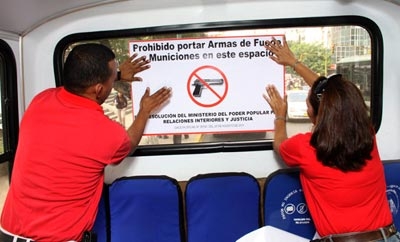Venezuela has extended a nationwide ban on the commercial sale of firearms for another year, even though the policy has so far had little impact on curbing the country’s rising murder rate.
Weapons sales will continue to be prohibited and no new personal firearms licences will be granted within the next year, reported El Universal.
The move was announced during a ceremony in which 245 guns were decommissioned by the government, 60 percent of which were seized in the state of Miranda. These guns are in addition to the 16,000 that were destroyed in the first nine months of 2012.
The country tightened gun policy in 2011, with bans on carrying firearms on public transport and in bars. In June 2012, Venezuela made it illegal to sell firearms and ammunition, giving only the army, police and certain security bodies the right to buy guns. The number of public spaces in which the carrying of firearms was prohibited was also expanded to include areas where public events are held, liquor stores, and places under construction.
According to Interior and Justice Minister Nestor Reverol, nearly 85 percent of the population agree with the idea of permanently banning the carrying of firearms in Venezuela.
A second resolution enacted with the gun ban extension established norms for the seizure of arms in Venezuela’s prisons, where violence and corruption are rampant, making it obligatory to immediately turn confiscated arms in to the Defense Ministry, reported Venezolana de Television.
InSight Crime Analysis
The availability of firearms has been highlighted as one of the primary causes of Venezuela’s high murder rate, though the stricter controls have yet to have a noticeable impact on violence levels. According to the Venezuelan Observatory of Violence (Observatorio Venezolano de la Violencia), there was a homicide rate of 73 per 100,000 in 2012, making Venezuela the most dangerous country in South America. This marked a significant increase on 2011, previously the country’s most violent year on record, with a rate of 67 per 100,000.
Before the latest set of gun control measures was imposed in 2011, there were estimated to be between 1.6 and 4.1 million civillian firearms circulating in Venezuela, indicating the scale of the challenge facing the Venezuelan authorities in carrying out meaningful disarmament.
The situation is also sometimes exacerbated by state institutions; the country’s security forces have been implicated in the illegal arms trade and the government distributes arms to volunteer civillian militia units, with little control over whether those weapons reemerge in the black market.

